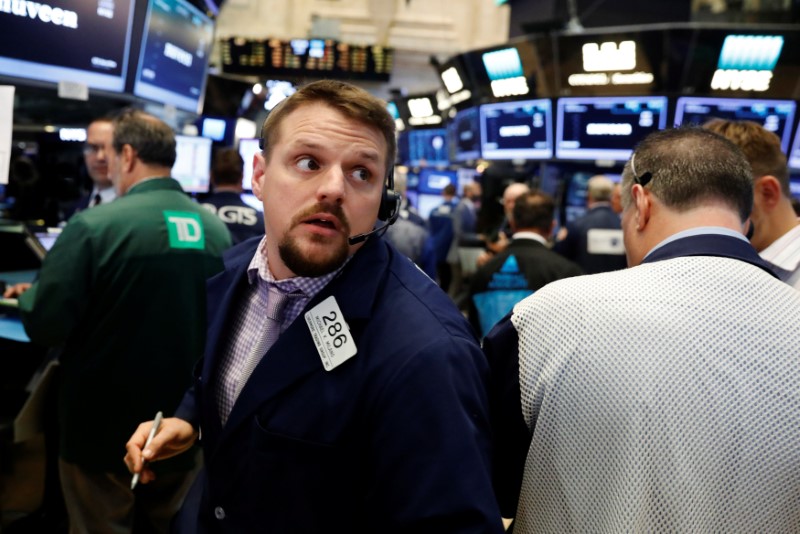By Lewis Krauskopf
(Reuters) - Wall Street fell sharply on Thursday with the S&P 500 and Dow industrials on track for their worst daily drops in six weeks as investors continued a recent move out of technology shares.
The technology sector (SPLRCT), which has led the S&P 500's 8-percent gain for the year, dropped 2.1 percent, and were the worst-performing major group. Declines in big tech stocks, including Apple (O:AAPL) and Microsoft (O:MSFT), weighed the most on the benchmark S&P.
Financials (SPSY) and energy (SPNY) were the only sectors in positive territory as investors may have been rotating into groups that have lagged this year.
"U.S. equities have remained extended, at or close to record territory for an extended period of time really without a tremendous amount of conviction in the market," said Peter Kenny, senior market strategist at Global Markets Advisory Group, in New York.
"It’s really been treading water. Without a major stimulus to drive prices higher, equities have to reset and that’s what they’re doing today," Kenny said.
The Dow Jones Industrial Average (DJI) fell 167.7 points, or 0.78 percent, to 21,286.91, the S&P 500 (SPX) lost 21.67 points, or 0.89 percent, to 2,419.02 and the Nasdaq Composite (IXIC) dropped 109.49 points, or 1.76 percent, to 6,124.92.
The CBOE Volatility index (VIX), the widely followed barometer of expected near-term stock market volatility, rose as high as 15.16, its highest level in six weeks.
Equity investors also may be concerned about the rise in interest rates globally, with European stocks also falling.
With the second quarter coming to a close, the market has experienced a volatile few days. Just on Wednesday, the tech-heavy Nasdaq had posted its best day since Nov. 7, and tech remains the best-performing sector this year.
“Large-cap tech and software are extended on a valuation basis," Kenny said. "The opposite is the case in financials and in energy."
Financials were the bright spot for the stock market, rising 0.8 percent.
Bank stocks gained after the U.S. Federal Reserve approved the banks' plans to raise dividend payouts and share buybacks under its annual stress test program. Wells Fargo (N:WFC) shares rose 2.6 percent while Citigroup (N:C) gained 3.3 percent.
Energy rose 0.4 percent. Oil prices (CLc1) edged up after a decline in weekly U.S. crude production temporarily alleviated concerns about deepening oversupply.
Investors have been concerned about tepid data about U.S. economic growth as the Fed is raising interest rates from very low levels.
Data showed the U.S. economy slowed less sharply in the first quarter than initially estimated due to unexpectedly higher consumer spending and a bigger jump in exports.
The Fed can go it alone on monetary policy among global central banks but strong data is needed for that to continue, St. Louis Federal Reserve chief James Bullard said.
In corporate news, Rite Aid (N:RAD) slumped 29 percent after Walgreens Boots Alliance (O:WBA) scrapped its deal to buy Rite Aid after failing to win antitrust approval, but said it would instead buy nearly half of the smaller rival's U.S. stores. Walgreens shares rose 1.2 percent.

Declining issues outnumbered advancing ones on the NYSE by a 2.95-to-1 ratio; on Nasdaq, a 2.22-to-1 ratio favored decliners.